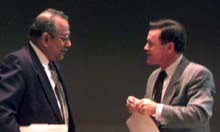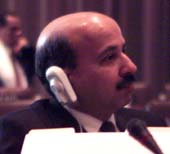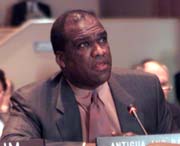 |
THE SEVENTH SESSION OF THE UN COMMISSION ON SUSTAINABLE DEVELOPMENT |
|
Briefing for Tuesday, 20 April |
"Commission on Sustainable Development at a crossroads" - CSD-7 Chair Simon Upton
Government ministers have informed the Chair of the seventh session of the United Nations Commission on Sustainable Development (CSD) that the body stands at a crossroads. Speaking at the opening of the seventh session of the CSD at UN Headquarters in New York Monday, Simon Upton (New Zealand) informed participants that ministers had informed him that they would lose interest in the Commission if it failed to produce "something substantive" this year.
Mr. Upton heads the first CSD Bureau to be elected one year in advance of the session it was to oversee. The members have used the opportunity to suggest changes in the CSD’s modus operandi. Mr.Upton used his opening speech Monday to explain that he has undertaken extensive consultations with ministerial colleagues who share his view that the CSD must come up with a new approach. He repeated that the CSD’s purpose is to "illuminate" and not negotiate lengthy texts. In an effort to steer the CSD outputs in this direction Mr.Upton invited participants in the CSD Intersessional meetings to produce short draft texts containing elements for decisions to accompany the more lengthy Chair’s summaries of discussions. Later in the week Mr. Upton will continue to encourage a new approach at the CSD High Level segment, when he will encourage ministers to hold back on prepared statements and participate in free wheeling exchanges.
Mr.Upton said he was pleased at the output from the Intersessionals. In the afternoon, however, Mr.Upton found himself struggling to make his ideas impact on the first Multi-stakeholder Dialogue Segment, on industry initiatives for sustainable tourism. Stakeholders from local government, industry, trade unions and NGOs, often resisted pleas from the Chair to limit their interventions to the topic in hand. At the end of the afternoon Mr.Upton invited the stakeholders to reconvene informally to provide him with some agreed recommendations. A local authority representative said the real test for the dialogue, however, would be the willingness of ministers to take recommendations on board during their high-level deliberations later in the week.
Voluntary industry initiatives turn full circle
The issue of voluntary industry initiatives turned full circle Monday afternoon when it was taken up in the context of a Multi-stakeholder exchange on industry and sustainable tourism. In the morning, participants heard that, arising from interactive discussion at CSD-6 last year, the Commission had invited representatives of industry, trade unions and NGOs to examine voluntary initiatives and agreements to identify those elements that can be considered for a review. In response to this mandate, a Multi-Stakeholder Consultative Meeting convened in Toronto (Canada) from 10-12 March 1999, to identify key elements of a review of voluntary initiatives and agreements. Participants emphasized that:
- Any review of voluntary initiatives should take into account their great diversity and the need to place a voluntary initiative or agreement within its appropriate social, environmental and economic policy context;
- Voluntary initiatives and agreements should complement regulatory frameworks and foster continuous improvement;
- Voluntary initiatives and agreements constitute one type among a range of instruments that can be used to achieve sustainable development;
- The particular needs of developing countries, including capacity building of various stakeholders, should be given special attention.
Participants also identified at least nine elements that would need to be considered in the context of any review with a view to stimulating better understanding and continual improvement: impetus and context; purpose and design of the voluntary initiative and agreement; multi-stakeholder participation; commitment to sustain the voluntary initiative or agreement; mutual trust and respect; monitoring and assessment; verification; communication; replication and capacity building.
In the Corridors
The role of the UN Commission on Sustainable Development in providing a global platform and networking opportunity for stakeholders was demonstrated Monday by the signing of a Memorandum of Understanding between the tourism industry body, the World Travel and Tourism Council, and the International Council for Local Environmental Initiatives. The two organisations agreed, among other things, to explore how the principles of Agenda 21 for Travel and Tourism and Local Agenda 21 planning can be reciprocally integrated into their respective work.
|
Photos and RealAudio for 19 April |
Opening Plenary
| Men with a mission: Nitin Desai, Under-Secretary-General, Department of Economic and Social Affair and CSD-7 Chair Simon Upton. | |
 |
|
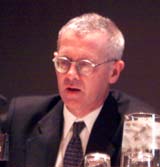 |
|
|
workshop on voluntary initiatives held in Toronto from 10-12 March 1999. |
|
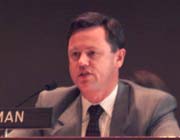 |
|
| CSD-7 Chair Simon Upton talking with G-77/China Spokesperson Alison Dreyton | |
|
Under-Secretary-General
Nitin Desai discussing the week ahead with the delegate from China
|
 |
Return to ENB's CSD-7 home page
© Earth Negotiations Bulletin, 1999. All rights reserved.
